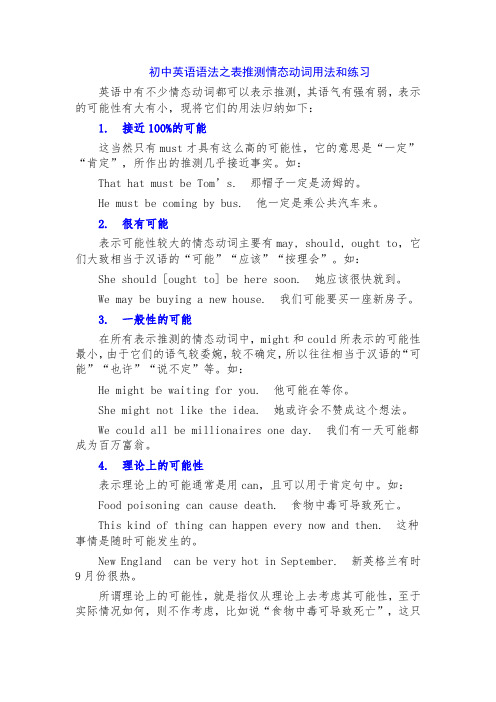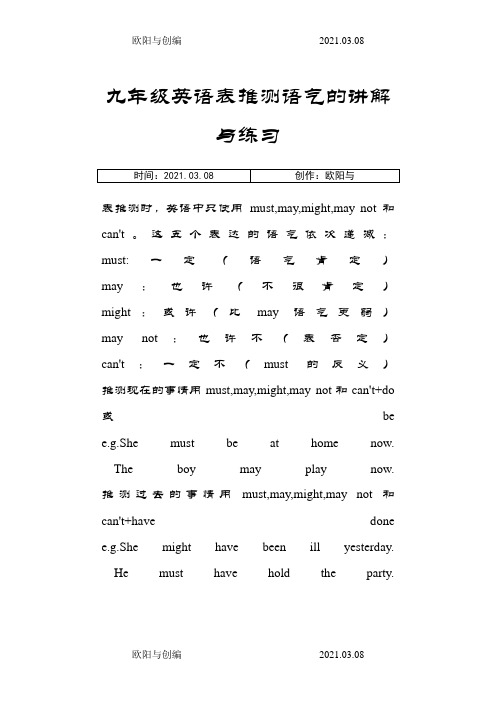情态动词表推测的讲解及练习题
初中英语语法之表推测情态动词用法和练习

初中英语语法之表推测情态动词用法和练习英语中有不少情态动词都可以表示推测,其语气有强有弱,表示的可能性有大有小,现将它们的用法归纳如下:1. 接近100%的可能这当然只有must才具有这么高的可能性,它的意思是“一定”“肯定”,所作出的推测几乎接近事实。
如:That hat must be Tom’s. 那帽子一定是汤姆的。
He must be coming by bus. 他一定是乘公共汽车来。
2. 很有可能表示可能性较大的情态动词主要有may, should, ought to,它们大致相当于汉语的“可能”“应该”“按理会”。
如:She should [ought to] be here soon. 她应该很快就到。
We may be buying a new house. 我们可能要买一座新房子。
3. 一般性的可能在所有表示推测的情态动词中,might和could所表示的可能性最小,由于它们的语气较委婉,较不确定,所以往往相当于汉语的“可能”“也许”“说不定”等。
如:He might be waiting for you. 他可能在等你。
She might not like the idea. 她或许会不赞成这个想法。
We could all be millionaires one day. 我们有一天可能都成为百万富翁。
4. 理论上的可能性表示理论上的可能通常是用can,且可以用于肯定句中。
如:Food poisoning can cause death. 食物中毒可导致死亡。
This kind of thing can happen every now and then. 这种事情是随时可能发生的。
New England can be very hot in September. 新英格兰有时9月份很热。
所谓理论上的可能性,就是指仅从理论上去考虑其可能性,至于实际情况如何,则不作考虑,比如说“食物中毒可导致死亡”,这只是理论上的一种推断,至于某人某次食物中毒了,他是否会死亡,则不在考虑之列,所以说,这种推测是非常“宏观”的!5. 表示对过去情况作推测如果表示对已经发生的情况作推测,不能用“情态动词+动词原形”,也不能用“情态动词的过去式+动词原形”,而是要使用“情态动词+动词完成式”。
初一英语情态动词推测用法练习题40题含答案解析

初一英语情态动词推测用法练习题40题含答案解析1.There must be a lot of students in the library. It's very quiet.must becan't bemight becould be答案解析:must be。
“must be”表示肯定的推测,意思是“一定是”。
图书馆很安静,通常情况下安静的地方可能有很多学生在学习,所以用“must be”比较合理。
“can't be”表示否定的推测,不符合题意。
“might be”和“could be”表示可能性较小的推测,没有“must be”肯定。
2.The boy in the classroom must be Tom. He is the only one who wears a blue shirt today.must becan't bemight becould be答案解析:must be。
题干中明确指出男孩是唯一穿蓝色衬衫的人,所以肯定是Tom,用“must be”。
“can't be”否定推测不符合。
“might be”和“could be”可能性小,不如“must be”确定。
3.There must be some books on the desk. I saw the teacher put them there.must becan't bemight becould be答案解析:must be。
看到老师把书放在桌子上了,所以肯定有书在桌子上,用“must be”。
“can't be”不对。
“might be”和“could be”表示不确定,这里已经确定看到老师放书了。
4.The girl who is singing must be Lily. She has a beautiful voice.must becan't bemight becould be答案解析:must be。
初一英语情态动词推测用法练习题30题(答案解析)

初一英语情态动词推测用法练习题30题(答案解析)1.He must be in the classroom.He can't be in the library.He might be in the playground.答案解析:must 表示肯定的推测,“一定”;can't 表示否定的推测,“不可能”;might 表示可能性较小的推测,“可能”。
根据题干“他一定在教室”,说明说话者比较确定,所以选择must be in the classroom。
排除can't be in the library,因为题干是肯定在教室,不可能在图书馆;might be in the playground 可能性较小,不符合题干比较确定在教室的语境。
2.She must be doing her homework.She can't be watching TV.She might be reading a book.答案解析:must be doing 表示对正在进行的事情肯定的推测,“一定正在做”;can't be doing 表示对正在进行的事情否定的推测,“不可能正在做”;might be doing 表示对正在进行的事情可能性较小的推测,“可能正在做”。
根据题干“她一定在做作业”,说明说话者比较确定,所以选择must be doing her homework。
排除can't be watching TV,因为题干是肯定在做作业,不可能在看电视;might be reading a book 可能性较小,不符合题干比较确定在做作业的语境。
3.It must be sunny outside.It can't be raining.It might be cloudy.答案解析:must be 表示肯定的推测,“一定”;can't be 表示否定的推测,“不可能”;might be 表示可能性较小的推测,“可能”。
情态动词表推测的讲解及练习题讲课稿

表推测时,英语中只使用must,may,might,may not和can't。
这五个表达的语气依次递减:must:一定(语气肯定)可能性最大may might ;can could 可能不确定可能性不大may not:也许不(表否定)can't:一定不;不可能(must的反义)可能性为零推测现在的事情用must,may,might,may not和can't+do或bee.g.She must be at home now. The boy may play now.推测过去的事情用must,may,might,may not和can't+have donee.g.She might have been ill yesterday. He must have hold the party.情态动词must, can, could, may, might表推测的用法情态动词中的must, can, could, may, might都表推测。
其中must的可能性最大,can / could 次之,may / might最小。
具体用法如下:1.must的用法(1)表示推测“可能性”时,意思是“一定、准是”,语气较肯定,较有把握。
He must be American. = It is certain that he is American. 他准是个美国人。
(2)must表推测只能用于肯定句。
如果要表示“一定不、肯定不”的意思时,应用can’t,如询问某种可能时,应用can。
He must know my address. 他肯定知道我的地址。
(一定)He can’t know my address. 他肯定不知道我的地址。
(一定不)Can he know my address? 他知道我的地址吗?(询问可能性)(3)must表示推测时,可以推测现在/正在发生的动作/过去发生的动作。
情态动词表推测的讲解及练习题之欧阳与创编

九年级英语表推测语气的讲解与练习表推测时,英语中只使用must,may,might,may not和can't。
这五个表达的语气依次递减:must:一定(语气肯定)may:也许(不很肯定)might:或许(比may语气更弱)may not:也许不(表否定)can't:一定不(must的反义)推测现在的事情用must,may,might,may not和can't+do 或be e.g.She must be at home now. The boy may play now. 推测过去的事情用must,may,might,may not和can't+have done e.g.She might have been ill yesterday. He must have hold the party.情态动词must, can, could, may, might表推测的用法情态动词中的must, can, could, may, might都表推测。
其中must的可能性最大,can / could次之,may / might最小。
具体用法如下:1.must的用法(1)表示推测“可能性”时,意思是“一定、准是”,语气较肯定,较有把握。
He must be American. = It is certain that he is American. 他准是个美国人。
(2)must表推测只能用于肯定句。
如果要表示“一定不、肯定不”的意思时,应用can’t,如询问某种可能时,应用can。
He must know my address. 他肯定知道我的地址。
(一定)He can’t know my address. 他肯定不知道我的地址。
(一定不)Can he know my address? 他知道我的地址吗?(询问可能性)(3)must表示推测时,可以推测现在/正在发生的动作/过去发生的动作。
一.情态动词表推测 有答案

一.情态动词表推测(一)意思:表示肯定推测的情态动词按可能性大小依次为must, should / ought to, may, might, could;否定推测,常用can’t / couldn’t,译为“不可能”,表示推测的语气非常肯定,may not, might not译为“可能不”、“也许不”,表示推测的语气不很肯定。
(二)句式:顺口溜:肯不肯, 妈妈肯,妹不问。
即: can不用于肯定式; must仅用于肯定句;may(might)不用于疑问式,用于否定和疑问句。
1.can 通常只用于否定句或疑问句,一般不用于肯定句,而could 可用于肯定句、否定句和疑问句。
两者没有时间上的差别,只是could 比can 更委婉,更不确定。
can’t 不可能It can’t [couldn’t] be true. 那不可能是真的。
What can [could] they do? 他们会在干什么呢?We could go there this summer. 今年夏天我们可能要去那儿。
(1) —I’ve taken someone else’s green sweater by mistake.—It _d__ Harry’s. He always wears green.A. has to beB. will beC. mustn’t beD. could be(2)You ___b___ be hungry already ,you had lunch only two hours ago!A. wouldn’tB. can’tC. mustn’tD. needn’t(3)—D o you know where David is? I couldn’t find him anywhere.—Well. He ___c___ have gone far——his coat’s still here.A. shouldn’tB. mustn’tC. can’tD. wouldn’t(4) Michael _b_ be a policeman,for he's much too short.A.need'tB.can'tC.shouldD.may注:can 有时也用于肯定句中表示推测,主要用于表示理论上的可能性(即从理论上看是可能的,但实际未必会发生)Anybody can make mistake. 任何人都可能犯错误。
中考英语情态动词推测基础运用练习题30题含答案解析
中考英语情态动词推测基础运用练习题30题含答案解析1.There must be someone in the classroom. The light is on.A.canB.mustC.mightD.could答案解析:B。
“must”在这里表示肯定的推测,语气最强,因为灯亮着,所以很肯定教室里有人。
“might”和“could”表示可能性较小的推测,“can”一般表示能力或可能性,在这里不太符合语境。
2.She can't be at home. She has gone to school.A.mustB.can'tC.mayD.could答案解析:B。
根据后一句“她去学校了”可知她肯定不在家,“can't”表示否定的推测,语气较强。
“must”表示肯定推测,这里不合适;“may”和“could”表示可能性较小的推测,也不符合。
3.The boy in blue look very tired. He must have stayed up late last night.A.mustB.can'tC.may答案解析:A。
“must”在这里表示肯定的推测,语气较强,因为男孩看起来很累,所以推测他昨晚肯定熬夜了。
“can't”表示否定推测,不符合;“may”和“could”可能性较小,没有“must”符合语境。
4.There may be some books on the desk.A.mustB.mayC.can'tD.could答案解析:B。
“may”表示可能性的推测,语气较弱。
“must”表示肯定推测,这里不确定书一定在桌子上;“can't”表示否定推测;“could”也表示可能性较小,但没有“may”正式。
5.He might be at the library.A.mustB.can'tC.mayD.might答案解析:D。
情态动词表推测的讲解及练习题
;表推测时,英语中只使用must,may,might,may not和can't。
这五个表达的语气依次递减:must:一定(语气肯定)may:也许(不很肯定)might:或许(比may语气更弱)may not:也许不(表否定)can't:一定不(must的反义)推测现在的事情用must,may,might,may not和can't+do或bemust be at home now.The boy may play now.推测过去的事情用must,may,might,may not和can't+have donemight have been ill yesterday.He must have hold the party.情态动词must, can, could, may, might表推测的用法情态动词中的must, can, could, may, might都表推测。
其中must的可能性最大,can / could次之,may / might最小。
具体用法如下:的用法(1)表示推测“可能性”时,意思是“一定、准是”,语气较肯定,较有把握。
He must be American. = It is certain that he is American. 他准是个美国人。
(2)must表推测只能用于肯定句。
如果要表示“一定不、肯定不”的意思时,应用can’t,如询问某种可能时,应用can。
He must know my address. 他肯定知道我的地址。
(一定)He can’t know my address. 他肯定不知道我的地址。
(一定不)—Can he know my address 他知道我的地址吗(询问可能性)(3)must表示推测时,可以推测现在/正在发生的动作/过去发生的动作。
He must have a car now. (现在)他一定有辆小汽车。
(完整版)情态动词表推测用法总结及练习(可编辑修改word版)
情态动词表推测用法总结(一)情态动词表推测的三种句式能用于表推测的情态动词:must, can, could, will, would, may, might, should, ought to1.在肯定句中一般用must (一定),may(可能),might / could(也许,或许)。
(1)He must/may/might know the answer to this question? 他一定/可能/也许知道这个问题的答案。
(2)It is cold in the room. They must have turned off the heating. 屋里很冷,他们肯定把暖气关了。
2.否定句中用can’t /couldn’t(不可能), may not/might not(可能不)。
(1)It can’t/couldn’t be the headmaster. He has gone to America. 这不可能是校长,他去美国了。
(2)He may not/might not know the scientist. 他也许不认识那位科学家。
3.疑问句中用can/could (能……?)。
(1)Could he have finished the task? 他可能把任务完成了吗?(2)Can he be at home now? 他现在能在家吗?注:以上三种句式中情态动词的语气按程度都是依次递减的。
might, could 并非may, can 的过去式,而表示语气较为委婉或可能性较小。
Couldn’t 比can’t 语气弱一些。
(二)情态动词表推测的三种时态1.对将来情况的推测,用“情态动词+ 动词原形”。
(1)She must / may / might / could arrive before 5. 5:00 前她一定/可能/也许到。
(2)She must/may/might/could walk miles and miles among the hills without meeting anyone.她一定/可能/也许会在ft里一连走好几英里而遇不到一个人。
情态动词表推测练习
情态动词表推测练习
1.他不可能走得这么早。
2.我本该想到这一点的。
3.你没有必要提这件事。
4.你一定是误会我了。
5.你本可以帮助我的。
为什么只坐在一旁瞧着?
6.他怎么会知道?会是哪个人告诉她了吗?
7.此时他本该到了的。
8.看看都什么是时候了。
十分钟之前我们就该到剧院了。
9.你当时不必那么匆忙的。
10.你们那时非得把它卖了不可吗?
“情态动词+完成式”的用法:
1. must + have done:用于肯定句,表示推测,意为“一定(已经)……”。
2. can + have done:用于否定句或疑问句,表示推测,意为“可能(已经)……”。
3. could + have done:可用于肯定句、否定句或疑问句,表示推测、责备或遗憾等,意为“可能……”、“本来可以……”、“本来应该……”等。
4. should + have done:可用于肯定句、否定句或疑问句,表示责备或遗憾等,意为“本来应该……”。
5. need + have done:用于否定句或疑问句,用于否定时意为“本来不必”,用于疑问句时意为“有必要……吗”。
6. may + have done:用于肯定句或否定句,表示推测,意为“可能(已经)……”。
7. might + have done:用于肯定句或否定句,表示推测,意为“可能(已经)……(此时 might 可换为 may);另外还可以表示过来可能发生的事结果未发生,意为“本来会……”(此时 might 不能换为 may)。
- 1、下载文档前请自行甄别文档内容的完整性,平台不提供额外的编辑、内容补充、找答案等附加服务。
- 2、"仅部分预览"的文档,不可在线预览部分如存在完整性等问题,可反馈申请退款(可完整预览的文档不适用该条件!)。
- 3、如文档侵犯您的权益,请联系客服反馈,我们会尽快为您处理(人工客服工作时间:9:00-18:30)。
九年级英语表推测语气的讲解与练习表推测时,英语中只使用must,may,might,maynot和can't。
这五个表达的语气依次递减:情态动词must,can,could,may,might表推测的用法情态动词中的must,can,could,may,might都表推测。
其中must的可能性最大,can/could次之,may/might最小。
具体用法如下:1.must的用法(1)表示推测“可能性”时,意思是“一定、准是”,语气较肯定,较有把握。
HemustbeAmerican.=ItiscertainthatheisAmerican.他准是个美国人。
(2)如询问某(3)注:(4must后(1)can在(2)can/can’t后可接进行时/完成时,表示对现在发生的动作或过去发生的动作进行推测。
Theycan’tbereadinginthelibrary.他们一定不在图书馆读书。
Hecan’thavegonetoShangh aiforIsawhimaminuteago.他不可能去了上海,我刚才还看见他。
It’ssolate.Wherecanshehavegone?天晚了,她可能去哪儿了呢?(3)在反意疑问句中,当陈述部分含有表示推测意义的can’t时,疑问部分的助动词应与can’t 后面的动词在非推测情况下的用法保持一致.Hecan’tbeateacher,ishe?他不是教师,是吗?Shecan’thavefinishedherhomework,hasshe?她一定没有完成家庭作业,是不是?could可用于表示某事有可能发生表示可能性不大的推测。
意思相当于may/mightDon’teatit.Itcouldbepoisonous.不要吃它,可能有毒。
Theplanecouldbedelayedbyfog.飞机可能会因为雾晚点。
(5)could还可以用于表示客气、委婉、礼貌的请求语气。
Excuseme,couldyoutellmethewaytothebusstation?Couldyouhelpme?(6)couldn’t表示否定推测,表示某事不可能真实,或由于特定事实或环境某事肯定不会发生。
Itco uldn’tpossiblybepoison.这不可能是毒药。
3.may(1)注:(2)(3)(4)能用于表推测的情态动词:must,can,could,will,would,may,might,should,oughtto1.在肯定句中一般用must(一定),may(可能),might/could(也许,或许)。
(1)Hemust/may/mightknowtheanswertothisquestion?他一定/可能/也许知道这个问题的答案。
(2)Itiscoldintheroom.Theymusthaveturnedofftheheating.屋里很冷,他们肯定把暖气关了。
2.否定句中用can’t/couldn’t(不可能),maynot/mightnot(可能不)。
(1)Itcan’t/couldn’tbetheheadmaster.HehasgonetoAmerica.这不可能是校长,他去美国了。
(2)Hemaynot/mightnotknowthescientist.(1)Hemust/may/might/couldbelisteningtotheradionow.他一定/可能/也许正在听收音机。
(2)Hecan’t(couldn’t)/may(might)notbeathomeatthistime.这个时候他不可能/可能不在家。
(3)Mr.Bushisontimeforeverything.Howcan(could)hebelatefortheopeningceremony?布什先生一向准时,这次开幕式他怎么可能迟到呢?3.(1)Itmust/may/might/couldhaverainedlastnight.Thegroundiswet.地湿了,昨晚肯定/可能/也许下雨了。
(2)Thedoorwaslocked.Hecan(could)not/may(might)nothavebeenathome.(3)(4(5)(虚拟)(6)(1)否定句:can’t(=couldn’t)、mayn’t、mightn’t疑问句:can、could(语气更加委婉不确定)(2)时态部分:be havedonebedoing语气部分写在前时态部分写在后,组合在一起就是推测(三)几组表推测的情态动词用法“情态动词+完成时”是历年高考的热点,在做此类练习时,既需要掌握这Wecouldhavewalkedtothestation,itwassonear.我们本来是可以走到车站去的,路很近。
3.may(might)havedone(1)表示对已经发生的事情的不太肯定的推测,意为“可能已经,或许已经”。
(2)虚拟用法表示本可以做,但却没做(表示很委屈地责备)Ifwehadtakentheotherroad,wemighthavearrivedearlier.如果我们选择另一条路,我们可能会到得早一些。
Hemighthavegivenyoumorehelp,hewasverybusy.他本来是可以给你更多帮助的,尽管他很忙。
4.needn’thavedone指实际上做了本来不必要做的事,意为“本来不必”。
例如:我本想帮你,但我太忙了。
小试牛刀一、单项选择1John___cometoseeustonight,butheisn'tverysureyet.A.mayB.needC.can’tD.must2Johnisn’tintheclassroom.HeplaysoccerontheplaygroundwithBob.A.canB.mustC.shouldD.can’t3That_______notbeherhusband.Sheisstillsingle.A.mayB.canC.couldD.might4You___goandseeadoctoratoncebecauseyougotafever.A.canB.mustC.dareD.would5-CanyouspeakJapanese?-No,I____.A.mustn'tB.can'tC.needn'tD.maynot6-He___beintheclassroom,Ithink.-No,he___beintheclassroom.Isawhimgohomeaminuteago.A.9--3.─Therewerealreadyfivepeopleinthecarbuttheymanagedtotakemeaswell.─It______acomfortablejourney.A.can'tbeB.shouldn'tbeC.mustn'thavebeenD.couldn'thavebeen4.MysistermethimattheGrandTheatreyesterdayafternoon,sohe___yourlecture.A.couldn'thaveattendedB.needn'thaveattendedC.mustn'thaveattendedD.shouldn'thaveattended5.Iwasreallyanxiousaboutyou.You_____homewithoutaword.A.mustn'tleaveB.Shouldn'thaveleftC.Couldn'thaveleftD.needn'tleave6.Oh,I’mnotfeelingwellinthestomach,I_____somuchfriedchickenjustnow.A.shouldn’tcutB.mustn’thaveeatenC.shouldn’thaveeatenD.mustn’teat7.Mr.White_____at8:30forthe meeting,buthedidn’t’showup.A.shouldhavearrivedB.shouldarriveC.shouldhavehadarrivedD.shouldbearriving8.You______betired-you'veonlybeenworkingforanhour.A.mustnotB.won'tC.can'tD.maynot9.-Isn'tthatAnn'shusbandoverthere?-No,it_______behim-I'msurehedoesn'twearglasses.A.15.——AC16.——A.C.1.------C.didn’tneedtoD.shouldwait2.Harry______havewonthePhysicscompetitioneasilyyesterday,buthegaveup.A.couldB.mightC.shouldD.must3.---MayIspeaktoyourmanagerMr.Smithatsixo’clocktonight?”---“I’msorry,Mr.Smithtoaconferencebeforethen.”A.willhavegoneB.hadgoneC.wouldhavegoneD.hasgone4.---Tomtookawayourteacher’scellphonewithoutbeingp ermitted.---Really?Ican’timaginethathe_______havedonesuchathing.A.mustB.mayC.canD.should6.Theweatherturnedouttobefineyesterday.I_________thetroubletocarrymyumbrellawithme.A.shouldhavetakenB.couldhavetakenC.needn'thavetakenD.mustn'thavetaken7.Hepaidforaseat,whenhe______haveenteredfree.A.couldB.wouldC.mustD.need8.Ididn’tseeherinthemeetingroomthismorning.Sheatthemeeting.A.mustn’thavespokenB.mightn’thavespokenC.can’thavespokenD.shouldn’thavespoken9.---Hi,isthatPeterBrown?10.。
